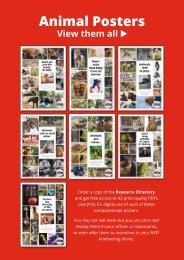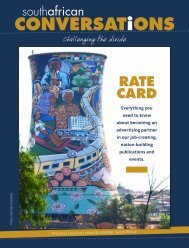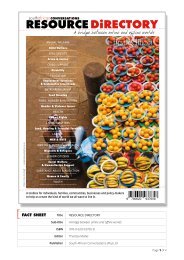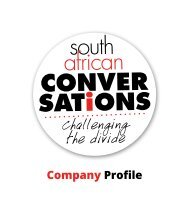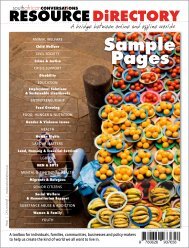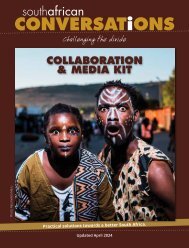South African Conversations sample articles
Insight into who we are as a people. Empowering, practical information. A platform for people who are otherwise voiceless. Suggestions for action by individuals, families, concerned onlookers, businesses and policy-makers to help create a better world for all of us. The South African Conversations magazine is a source of practical, solutions-oriented information. It empowers individuals, families and communities, raises awareness about the lived reality of people who are marginalised, and suggests options for action by concerned onlookers, businesses and policy-makers. The magazine is for sale exclusively by unemployed people who earn 50% of the cover price. Our distribution network is through NPOs across South Africa. These Distribution Hubs earn 17% of the cover price for supplying magazines to sellers and negotiating safe sales spaces for them in places with high levels of affluent foot traffic. Enjoy these sample articles and look for opportunities sprinkled throughout to collaborate with us.
Insight into who we are as a people. Empowering, practical information. A platform for people who are otherwise voiceless. Suggestions for action by individuals, families, concerned onlookers, businesses and policy-makers to help create a better world for all of us.
The South African Conversations magazine is a source of practical, solutions-oriented information. It empowers individuals, families and communities, raises awareness about the lived reality of people who are marginalised, and suggests options for action by concerned onlookers, businesses and policy-makers.
The magazine is for sale exclusively by unemployed people who earn 50% of the cover price. Our distribution network is through NPOs across South Africa. These Distribution Hubs earn 17% of the cover price for supplying magazines to sellers and negotiating safe sales spaces for them in places with high levels of affluent foot traffic.
Enjoy these sample articles and look for opportunities sprinkled throughout to collaborate with us.
Create successful ePaper yourself
Turn your PDF publications into a flip-book with our unique Google optimized e-Paper software.
southafrican CONVERSATiONS<br />
<strong>sample</strong> content<br />
29<br />
/ 011 538 8600 | recyclingevents@<br />
mpact.co.za | www.mpactrecycling.<br />
co.za | f MpactRecycling<br />
PETCO | PET plastics labelled with<br />
the # 1 code on or near the bottom of<br />
bottles, containers, jars, punnets, tubs,<br />
food trays, sheet and film for packaging,<br />
etc. Find a recycling drop-off site, as well<br />
as information on how to start a recycling<br />
business on their resource-rich website<br />
| 021 794 6300 / WhatsApp 060 070<br />
2077 | info@petco.co.za | www.<br />
petco.co.za | f PETPlasticRecyclingSA<br />
Plastics SA | The mouthpiece of the<br />
<strong>South</strong> <strong>African</strong> plastics industry | 011<br />
314 4021 | enquiries@plasticsSA.<br />
co.za | www.plasticsinfo.co.za | f<br />
weloveplastic<br />
Polyco | All plastics | 021 531 0647 |<br />
admin@polyco.co.za | www.polyco.co.za<br />
Polystyrene Association Of <strong>South</strong><br />
Africa | Promotes the collection and<br />
recycling of polystyrene (cups, food<br />
trays, equipment packaging, etc.) |<br />
Info@polystyrenesa.co.za | www.<br />
polystyrenesa.co.za<br />
<strong>South</strong>ern <strong>African</strong> Plastics Recycling<br />
Organisation (SAPRO) | Represents<br />
plastics re-processors who procure<br />
sorted, baled end-of-life plastics and<br />
re-process it into raw material or<br />
manufacture new plastics products.<br />
In-depth information for people who<br />
want to start a recycle business | 072<br />
8202506 | gm@plasticrecyclingsa.co.za<br />
| www.plasticrecyclingsa.co.za | f<br />
plasticrecyclingsa<br />
If you own a rubbish bin, here’s<br />
what YOU can do to make a<br />
difference as an individual |<br />
n Take a look at the resources on these<br />
pages and educate yourself about the<br />
different recycling categories and about<br />
what can and can’t be recycled. If in<br />
doubt, contact your local municipality.<br />
n Organise your household, housing<br />
or office complex to sort rubbish<br />
into recyclable categories. It will help<br />
waste-pickers generate income more<br />
efficiently, without having to scavenge<br />
through the neighbourhood’s bins.<br />
n<br />
Start composting your organic waste to<br />
n<br />
n<br />
n<br />
n<br />
n<br />
help stop the generation of methane<br />
gas on rubbish dumps.<br />
Rinse and air-dry items – especially<br />
food containers.<br />
Separate items (bag, box or bin) AT<br />
LEAST into garbage for the landfill and<br />
recyclable items for the waste-picker to<br />
use, recycle or resell.<br />
Leave edible food protected and<br />
outside the rubbish bin. There are<br />
more hungry people out there than you<br />
can begin to imagine.<br />
Leave useable items – clothes, shoes,<br />
bedding, books, etc. – in a separate bag.<br />
Treat everyone you meet with respect!<br />
Here’s what you can do to make<br />
a difference as a business |<br />
n<br />
n<br />
n<br />
n<br />
n<br />
n<br />
Start recycling!<br />
Start separating and composting<br />
organic waste to save landfill space!<br />
Eliminate unnecessary packaging from<br />
your products.<br />
Use biodegradable packaging instead<br />
of plastic.<br />
Create central drop-off points on your<br />
premises where the public and other<br />
businesses can drop off recyclables.<br />
Allow waste-pickers to sort and recycle<br />
the rubbish for their own benefit.<br />
If you run a pay-point for waste-pickers,<br />
consider making the following available:<br />
• Sturdy trolleys. (If you brand them, you<br />
can treat it as a social responsibility<br />
expense, even though it will provide<br />
advertising exposure for your business.)<br />
• Protective clothing.<br />
• Ablution facilities where waste-pickers<br />
can have a shower.<br />
• Food parcels.<br />
• A nurse to monitor health conditions.<br />
• Access to financial services and a bank<br />
card to reduce the risk of carrying cash.<br />
• A business loan to purchase a bakkie to<br />
transport waste.<br />
Here’s what you can do to make<br />
a difference as a policy-maker |<br />
n<br />
n<br />
n<br />
n<br />
n<br />
n<br />
Incorporate waste-pickers into our<br />
country’s waste-management /<br />
recycling efforts.<br />
Install public litter bins that require<br />
the public to separate waste: plastic,<br />
glass, paper, rubbish for the dump.<br />
Give waste-pickers the task of emptying<br />
recyclable content regularly, thereby<br />
adding to their potential income and<br />
keeping our streets litter-free. Install<br />
these EVERYWHERE where people litter.<br />
Enforce existing littering laws.<br />
Supply recycling bins to all households,<br />
complexes and offices. Make it<br />
compulsory to sort waste.<br />
Supply composting bins, free of<br />
charge, on request from households<br />
and businesses that want to compost<br />
organic matter to fertilise their gardens.<br />
Freely download a number of excellent<br />
publications, including Waste Picker<br />
Integration Guideline For <strong>South</strong><br />
Africa from the Waste Research<br />
Development and Innovation (RDI)<br />
Roadmap | A Government initiative<br />
aimed at supporting <strong>South</strong> Africa’s<br />
transition to a circular economy,<br />
through the generation of scientific<br />
evidence for the waste sector | www.<br />
wasteroadmap.co.za<br />
Kindly report missing or incorrect information<br />
to talk.to.us@southafricanconversations.co.za<br />
n




